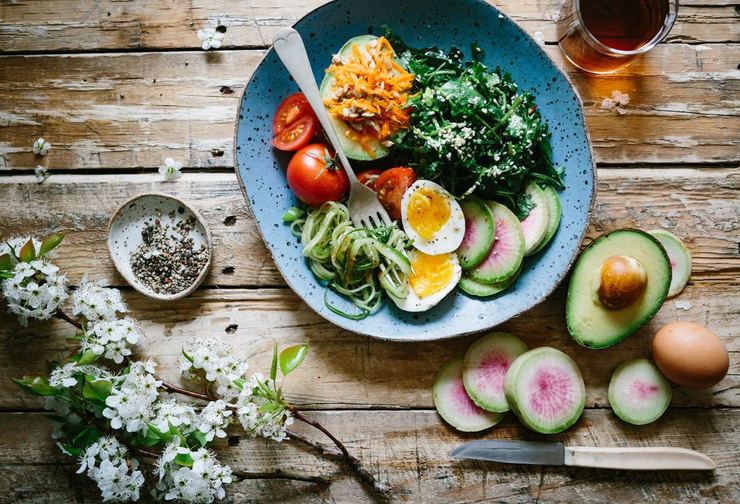|
I read an article by Dr. Weil recently and had a few thoughts about it: http://www.drweilblog.com/home/2016/2/22/want-to-drop-the-pounds-try-these-snacks.html. He’s a proponent of an anti-inflammatory diet, and I am too. I know it's really hard to think of changing our diets. When we are really sick, though, it might help turn our health around if we make some changes. Pick one thing and start with small, incremental change. I found that some different advice helped me heal.
First off, Dr Weil’s suggesting that folks snack throughout the day to keep their blood sugar levels even. Unfortunately for me, I found that advice to be great for keeping weight on. I followed it after I had kids as I was trying to lose the baby weight. I weighed 175 pounds for years after my kids were born and it was incredibly frustrating because I was working so hard to lose weight. What turned my life around was Dr. John Douillard’s advice— he’s the Ayurvedic doctor behind Lifespa.com. I lost 40 pounds and have kept it off for 5 years and counting. Dr. Douillard said the Ayurvedic way is to reduce the load on the digestive tract by not constantly grazing. He made the analogy to a car that is not functioning well. You don’t want to constantly be driving it— you want to limit its use so you don’t get stranded (until it can get repaired!) He led me through a cleanse that cleaned out the digestive tract, allowed it to repair itself, pulled accumulated toxins from the lymph system, reset the digestive fire, and cleared away old mucus and debris from the small intestine, where 80% of our immune system is located. Immediately I started feeling better. Dr. Weil is also talking about foods like pasta being a part of the diet, but I ended up not being able to eat it. Dr. Douillard suggested that I cut way back on wheat, if not cut it out completely, until my digestive tract was healed. It made sense to me because I'd been reading that this new modified wheat is very hard to digest. It took 3 1/2 months to notice the difference, but I stuck to it and I have never had a sinus infection since (as compared to having an average of 8 sinus infections that I had to go on antibiotics for each year.) I’m well enough now that I can cheat occasionally, like on Thanksgiving, but even then I never have wheat more than one time per day. I figure I am asking a lot of my system to digest it— better to save up the effort and put it all into digesting one meal with wheat in it. Why on earth would wheat cause a problem with my sinuses? It’s because I had leaky gut, which is way more common than folks realize. Every time I ate wheat, tiny particles escaped into my blood stream, which led to histamine being produced in my sinuses. That histamine caused an inflammatory reaction, which included mucus production, making my sinuses the perfect breeding ground for bacteria. So if you're healthy, you can afford to have wheat in your diet, and if you're at the weight you want to be grazing is great, but if you've got some unexplained digestion and health issues, try connecting with an Ayurvedic doctor. If s/he suggests cutting out wheat or dairy for a time, even if you can't bear to cut it out, try to cut back. You might notice that you feel a whole lot better. Photo by Brooke Lark on Unsplash
0 Comments
Digestion is handled by the right brain and the left brain working together. Our school system typically overdevelops the left brain (by cutting art classes, daily physical education and music they ignore developmental needs of the right brain), which leaves the right brain unable to do its share of the workload. I have a lot of interest in digestion as a result of my need to rebuild my health.
I read this article from a link I found on Twitter through Joy McCarthy of @joyoushealth. http://www.wellandgood.com/good-advice/5-surprising-ways-your-gut-affects-your-weight-mood-and-stress/?utm_campaign=socialflowfb&utm_source=facebook&utm_medium=social%20 I can second what Molly Gallagher of Well and Good is writing about— all of what she says is true. I’ll just add a few points to hers that I've found to be useful info over the years. 1. Our gut bacteria are definitely capable of manipulating our behavior by rewarding us with serotonin for behavior they want. We have bacteria that helps us and bacteria that are freeloaders. The freeloaders eat sugar. Eating sugar and things that break down into sugar easily, like processed grains, is feeding the enemy. We need a diet high in bioflavinoids to help heal leaky gut and the histamine response it generates. (See healinghistamine.com for more details. Yasmina Ykelenstam has done lots of research on what helps reduce inflammation in the gut and let it heal.) 2. While it’s true an imbalanced gut can keep us stuck in the bathroom, so does a lack of awareness about fiber and water. There are two types of fiber, and one of them, insoluble fiber, acts as a trigger for motility in the gut. So if you load up on high fiber foods like popcorn or raw food, you are asking for a bout of diarrhea or constipation—and it might not be what you expect: for example, the butter on popcorn can cause constipation for folks who don’t make enough bile. Becoming aware of foods with the other type of fiber (soluble) so that you can combine and balance your meals can save you a lot of misery later. As far as water goes, proper hydration is necessary for the body to move the food along within the digestive tract, otherwise it gets sticky and bogged down. 3. Taking probiotics can help with your stress levels is absolutely true. Probiotics help heal the gut and reduced infiltration by food particles into the blood stream means that the immune system is not going to be as activated. The immune system is part of the sympathetic nervous system, which is the fight-or-flight system. When your fight-or-flight system is activated, you are not able to digest food properly and you can’t absorb nutrients like you should. Your whole system shifts from healthy to inflamed and you don’t have the nutrients you need to repair your body. 4. Bad bacteria can make us store fat— yes, yes, yes. To whatever extent you can cut back on foods that trigger bad bacterial growth, I heartily recommend it. In addition, they can lead to anxiety and depression. Researchers have shown that combining psychotherapy with taking probiotics can be as effective as psychotherapy with anti-depressants. Talk to your doctor and psychologist before making any changes in your medicine. 5. It’s true that 80% of your immune system is in your gut— it’s in the gut-associated lymphatic tissue, which is meant to take toxins out of your system before they can be digested. Poor water consumption can lead to mucus coating this precious lymphatic tissue, which means that you are digesting toxins and storing them in your body. Ayurvedic medicine recommends drinking water 20 minutes before eating— this allows the stomach lining to be properly hydrated, too, so that the right amount of stomach acid can be made. (The body will reduce the strength of the stomach acid if the stomach isn’t properly hydrated to prevent damage to the stomach.) People with chronic ill health are at risk for having a high toxic load—an organic diet and an Ayurvedic cleanse and gallbladder flush can help clear the mucus and allow bile production to be reset to normal. My go-to Ayurvedic doctor is Dr. John Douillard at www.lifespa.com, who does phone consultations and has a website full of free articles. I learned all of the info in point #5 thanks to him. Photo by Christopher Campbell on Unsplash |
AuthorElizabeth Morse Archives
January 2024
Categories
All
|

